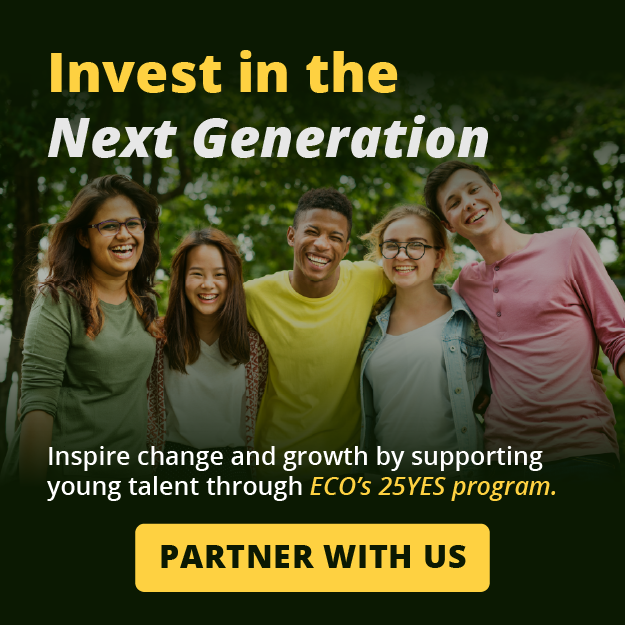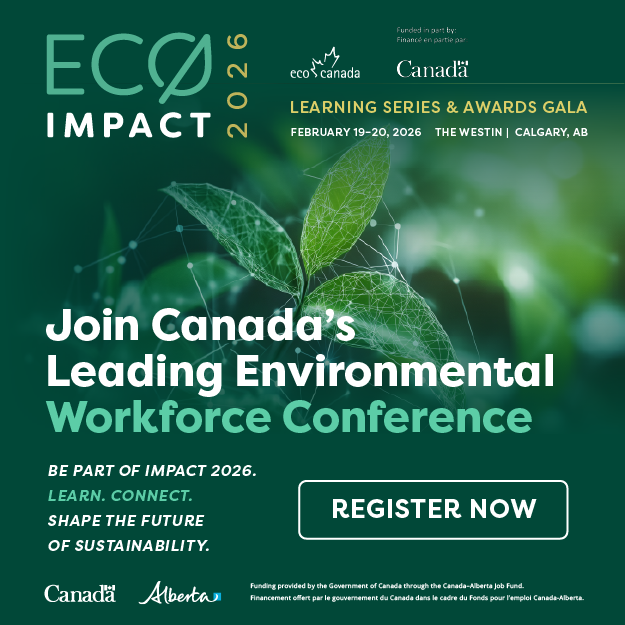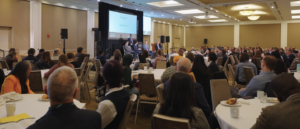We kicked off 2018 with a busy schedule of events and have no intention of slowing down. In our quest to meet with Environmental Professionals across Canada, we organized workshops, speakers, networking and webinars to hear from those working in the environmental sector and get some face time with our certified members.
Toronto
January 17th was a full day of events in Toronto beginning with a workshop held by our Licensed EP Trainer Steve Lamming, Ph.D. Steve delivered a course on Industrial Greenhouse Gas Quantification to a sold-out crowd. Each participant received a certificate of completion and was welcome to stay for our second event of the day.
At 4.00 pm we kicked off an Environmental Professional Networking Event on the theme of Climate Change: Opportunities with New Policies and Regulations. The evening portion was held in the Ada Slaight Hall at Daniels Spectrum, a LEED-certified building and was our second sold-out event of the day.
A packed house of close to 80 people attended to network and hear from our esteemed lineup of speakers.
The keynote address was given by Dr. Dianne Saxe, Environment Commissioner of Ontario. Dr. Saxe shared information on Ontario’s climate change initiatives such as phasing out coal power plants, implementing action plans and putting a price on carbon emissions. She also spoke about adaptation and climate resilience, clean technology, innovation and jobs.
The evening continued with a panel discussion on climate change policy and regulation and featured four expert panellists:
- Rija Rasul – Climate Change Specialist, Town of Caledon
- Robert J. Watters, Ph.D. – President & CEO, Watters Environmental Group Inc.
- Karen L. Smith, Ph.D. – Climate Change Impact Assessment Program Director, University of Toronto Scarborough
- Lindsay Wiginton, RPP, MCIP – Director, Transportation & Urban Solutions, Pembina Institute
- Yogendra Chaudhry, Ph.D, EP, CRSP – Vice President, Professional Services, ECO Canada (Moderator)
The panel discussion touched on a number of climate-change-related topics and the diversity of the panel allowed attendees to hear insights from academia, industry, government and NGO perspectives.
Ottawa
Late last fall we began planning a Speaker Series on Indigenous environmental education, training, and consultation. The first of these events was held in our nation’s capitol on January 31st.
The Speaker Series: Indigenous Training and Employment in the Environmental Sector brought together stakeholders interested in working together on providing these services to Indigenous communities and organizations across Canada.
We heard from a range of speakers working to make a meaningful and positive impact on the environmental sector.
The afternoon began with an introduction and presentation about ECO Canada’s initiatives, with emphasis on our BEAHR training programs.
Our in-house expert and VP of Advisory Services, Dr. Yogendra Chaudhry, spoke on building capacity within communities and developing a talent pool for environmental work through our short-term, community-based programs that combine traditional knowledge with technical, skills for environmental fieldwork.
Our second presentation was by Lynda Byron, EP(EMSLA), and Brad Cole of Blue Heron Environmental. With a focus on training Indigenous workers and helping them to find employment in Ontario’s mining industry, Brad and Lynda explained the unique development and training path that Blue Heron offers through it’s Zhashagi division (the Ojibway word for Blue Heron) and how to bridge the connections between communities and industry.
Lynda explained that quite often, stakeholders have the same objectives but there is a lack of clear communication to achieve shared goals. They have been providing strategies to bring groups together to create beneficial outcomes for all stakeholders.
We heard from Gary Pritchard, EP, a member of the Curve Lake First Nation in the Kawartha Tri-Lakes area. Gary is a Senior Aquatic Ecologist and Indigenous Engagement Liason at Skelton, Brumwell and Associates Inc.
Throughout his presentation, Gary spoke about the need to train community members as technical field staff, to mentor students, and the importance of combining traditional and ecological knowledge. He offered case studies of projects where it was needed to identify areas of cultural and environmental significance and sensitivity and how an integrated approach honouring traditional knowledge is a must.
Our last presentation in the speaker series was from Dan Peters of the Native Women’s Assosciation of Canada (NWAC). Dan provided insights into helping elevate Indigenous women within Canada and how the NWAC helps through a variety of programs.
Focusing on developing essential skills and employment opportunities, the NWAC offers women support through a variety of mediums. NWAC is a part of the Aboriginal Skills Employment Strategy (ASETS) and is looking into how to support skills training and develop strategic partnerships for the benefit of their recipients.
The NWAC has had a role in water protection, with Indigenous women having a strong, traditional connection to that element.
During our evening networking event, there was a great turnout despite watching inclement weather and traffic snarls roll in and out of the downtown area.
We were fortunate to have an interesting and engaging speaker for the evening – Pamela Kupeuna, Environmental Program Advisor for Indigenous and Northern Affairs Canada.
Pamela is from the Yellowknives Dene First Nation in the Northwest Territories and is half Inuk. Pamela graduated with a Bachelor of Environmental Studies from the University of Waterloo. For the past 15 years, she has worked as an Environmental Program Advisor with the Department of Indigenous Services Canada in the National Capital Region.
Pamela volunteers her time on three committees to help recruit, advance, retain and train Indigenous peoples in the Department. On this evening, Pamela spoke to us about her experience as an Indigenous woman. Her personal story of being a second-generation survivor of the residential school system, the impact of that on her family, and her own personal development and journey of reconciliation and peace was powerful and moving.
The feedback from our Ottawa event was so positive and we had many attendees ask us to host another event again in the near future.





